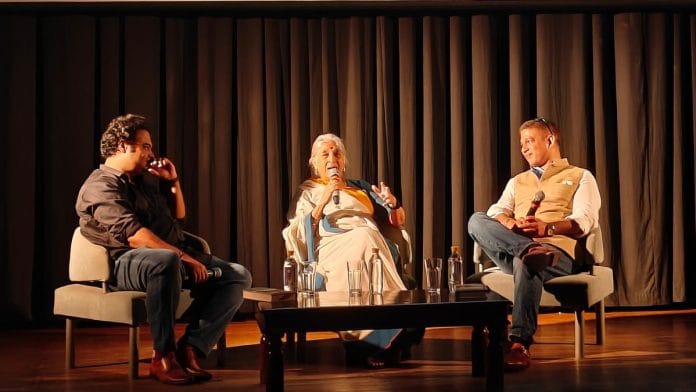New Delhi: For former parliamentarian and Marxist Subhashini Ali, stealing isn’t always a crime, especially when it served Indian soldiers kept in a Japanese prisoner of war camp during World War II in Singapore. Ali, daughter of Colonel Prem Sahgal and Captain Lakshmi Swaminathan, was speaking at the launch of the book The Forgotten Indian Prisoners of World War II in Delhi.
“My mother had been itching to get a piece of the action. Then she proceeded to steal supplies from the hospital, to send with my father to treat the soldiers and PoWs who needed them. So I guess stealing isn’t that bad after all, if it eventually leads to a relationship like theirs,” said Ali, whose parents were part of the Indian National Army.
Gautam Hazarika’s The Forgotten Indian Prisoners of World War II looks at the soldiers who fought alongside Subhas Chandra Bose in the Indian National army, and their lives as prisoners of war. Hazarika, a former banker based in Singapore, researches stories from World War II in Southeast Asia.
Ali and Hazarika were on the panel moderated by Rishi Majumder, co-founder of Indian History Collective. Major General Ian Cardozo AVSM SM formally released the book at the ML Bhartia Auditorium at Delhi’s Lodhi Estate on Tuesday, before a packed house full of war veterans and their families.
Ali recounted how her mother, a nationalist working as a doctor in a hospital run by the Japanese, had heard of the British Indian soldiers kept as prisoners of war in camps in Singapore.
The keynote address was delivered by Squadron Leader Rana TS Chhina MBE, which was followed by speeches from Harmohanjit Singh, son of General Mohan Singh, INA and Colonel Ravi Pillai, son of Lieutenant MM Pillai, MC of the Bombay Sappers. Singh and Pillai recalled the glory of their fathers.
“When my father (General Mohan Singh) was released from prison in Delhi on 4 May 1946, he went to Amritsar via train. Whenever the train stopped, there were huge crowds at every station, waiting to see him. Finally, he was made to sit on top of the train, so that everyone could see him,” recounted Singh.
His father would go on to form a semi-military organisation Desh Sevak Sena to rehabilitate people displaced by Partition.
Freedom
Col Ravi Pillai told the story of his father’s escape from a Japanese camp that involved meticulous planning — and luck. Lt Pillai’s first escape attempt was swimming across the islands. But he was forced to return as soon as he spotted sharks in the water. It was two and half months later that he would make a second attempt, along with his colleague Natarajan, and reach India. That one would set him free.
“When my father came back, he was only 44 kgs, which was starvation due to incarceration,” said Pillai, highlighting the terrible conditions under which the soldiers were living as prisoners of war.
Col Pillai would later visit Singapore with his wife and mother, taking a walk along the lanes he had heard about from his father.
Also read: Delhi was an intellectual hub in ’90s. It felt like anything was possible: Artist Bharti Kher
The families
The discussion, following the sharing of individual accounts, was a space for Hazarika to talk about his process of researching and writing the book.
The author mentioned an instance when he had to reach out to the family of a captain who was beheaded by the Japanese. He called up the captain’s grandson only to realise the family was unaware of how the captain had died. Hazarika then told him that a certain soldier from his grandfather’s regiment had sought justice for the beheaded.
“But the grandson told me, ‘you are the one who got my grandfather justice by writing about him’,” said an emotional Hazarika.
The evening was also filled with some nuggets of INA’s history. Not all recruits were driven by the passion to serve the larger cause.
“One person from Tamil Nadu joined INA because the rest of his regiment joined. Even though he could not understand any of Bose’s speeches. And another, an opioid addict, joined because he thought the salary would fund his addiction,” said Hazarika.
The panel also highlighted the dilemma soldiers faced when it came to joining the INA. Upon their return to India, many faced trial for treason. Those who chose Pakistan, after the Partition, were recruited by the country’s army and reached important military positions.
As the conversation moved forward, one audience member asked about the plight of the INA soldiers’ partners, who were waiting for their husbands to return, with no confirmation on whether they were even dead or alive.
One half of the story is about combat, and the other half is about the family, said Hazarika. The author mentioned how General Mohan Singh’s wife was asked to remarry because he was assumed dead. There were incidents of brothers marrying the ‘widows’ for property.
“I realise it has been a big miss on my part that the book cover has only four men, and if I ever write a second one, it will only have women on the cover,” promised Hazarika.
(Edited by Aamaan Alam Khan)






